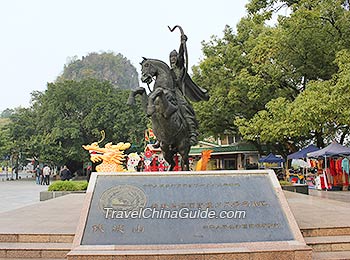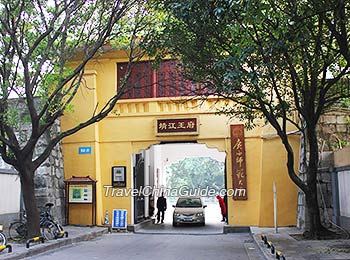Guilin History
 |
| General Fubo, who once protected Guilin from invaders |
As soon as Guilin is mentioned, the city's beautiful natural scenery will come to people's minds more vividly than its history. In fact, with the exception of its astonishing karst landscape, this city also boasts a long history that can be traced back for 10,000 years. It was the time of the Zengpiyan People who were in the matriarchal clan society. However, Guilin was not brought into the official prefecture until 214 B.C. when the first Emperor of the Qin Dynasty (221 B.C.-206 B.C.) set up the Guilin Shire in this region. At the same time, due to the construction of the Ling Canal, this place became one of the gateways between the Central Plains and the Lingnan Region (current Guangdong, Guangxi and part Hunan, Jiangxi). Later, in 111 of the Eastern Han Dynasty (25-220), the Shian County was founded in Guilin.
From then on, Shian (Guilin) was considered to be an important strategic spot for many ambitious schemers. During the tumultuous Three Kingdom Period (220-280), Shian was governed by the Shu State and the Wu State successively. Of course, Shian was developed to be a political center gradually. In the Tang Dynasty (618-907), Shian was renamed Lingui County and built to be an impressive southern prefecture. Turn to the Song Dynasty (960-1127), the territory of this region was extended to the current Hainan Island. As for the Ming (1368-1644) and Qing (1644-1911) dynasties, the important position of the Guilin region both in economy and politics was unshakable.
 |
| Prince Jinjiang's Mansion |
Benefiting from the solid political situation, the local culture also received further development during this period. Guilin was once the center of the noted Lingnan Culture which is a typical regional culture. However, the current center of the Lingnan Culture refers in particular to Guangdong Province. Fortunately, there are a number of historic sites left in that place for travelers to appreciate its past splendid culture. For example, the ancient Mansion of Prince Jingjiang is the best preserved mansion of the Prince in the Ming Dynasty. Nowadays, Solitary Beauty Peak located in the mansion is a must for travelers when they go there.
Because of its rich resources and advantageous geographical position, Guilin was a well-known base both for the just revolutionists and the warlords in the modern era of China. Especially during the period of the War of Resistance Against Japan, it was the resistance cultural center with a great number of active intellectuals. Therefore, Guilin's history and culture are balanced with its natural wonder.